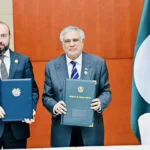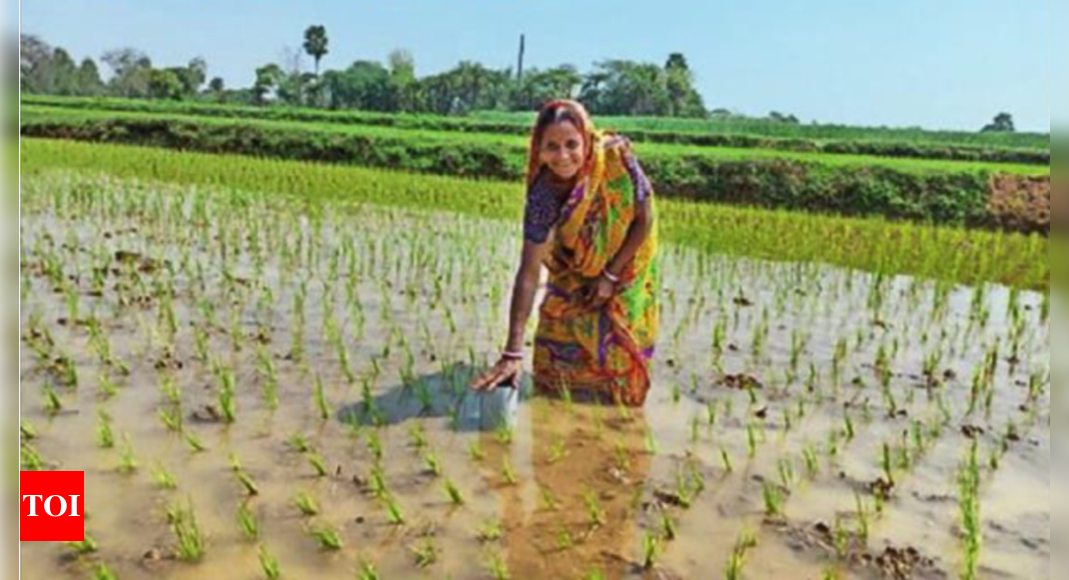TO Innovative irrigation technique, organic farming with solar energyand provide a business advantage to millet cultivation — Krishnendu Bandyopadhyay brings success stories from rural West Bengal
In the heart of West Bengal’s agricultural landscape, in the village of Simurali in the arid Bankura district, Maya Khan leads a silent revolution. In its two bighas (a bigha is a measurement between 1/3 of an acre and an acre) of rice fields, Maya has adopted an innovative irrigation method known as Alternative wetting and drying (AWD), marking a significant departure from traditional agricultural practices.
AWD is a sustainable rice growing technique that has gained global recognition for its effectiveness in conserving water, reducing labor costs, and reducing greenhouse gas emissions, introduced to the Mayans by SwitchON Foundation. Unlike traditional continuous flooding methods, AWD involves periodically drying and reflooding rice fields, allowing for better resource management.
At first, Maya was hesitant to adopt AWD, but after learning about its benefits, she decided to give it a try. The method consists of using a water pipe 30 cm long and 10 cm wide with holes along 15 cm of its length. The perforated section is inserted into the soil, allowing Maya to monitor soil moisture and determine the optimal time to reflood the field.
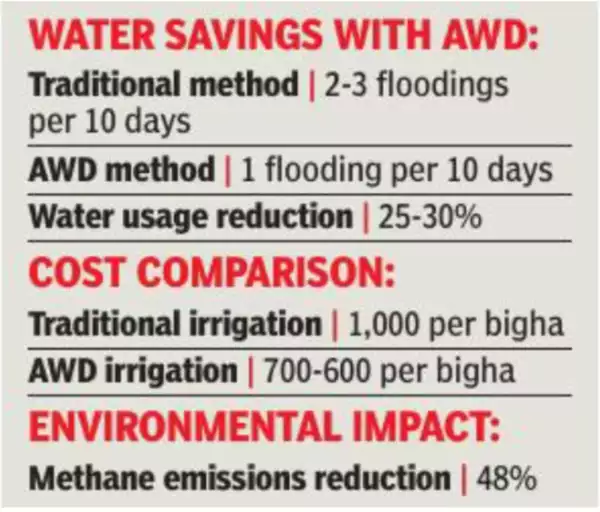
“Earlier, the cost of irrigation per bigha was Rs 1,000. After adopting AWD, the cost came down to Rs 700-600. Additionally, rice yield increased by 20%,” shared Maya.
The success of Maya and other farmers in the region is largely attributed to the efforts of the SwitchON Foundation, an organization that has been instrumental in promoting AWD through stakeholder meetings, training sessions, hands-on demonstrations, and the installation of 700 water pipelines across West Bengal will support the implementation of AWD. It has also trained 203 farmers in AWD techniques.

With AWD, SwitchON Foundation has empowered farmers to adopt climate smart agricultural practicesleading to greater food security and environmental sustainability.
Maya’s success with AWD is a testament to the potential of innovative farming techniques to transform agriculture.
In Jatrapur village in Nadia district of West Bengal, technology was once a distant dream for most farmers. The idea of accessing advanced farming tools or benefiting from government-sponsored schemes seemed unattainable.
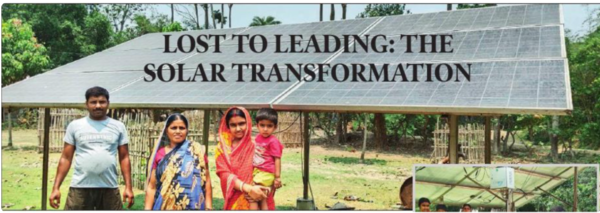
However, winds of change blew through this rural community when a young farmer named Alok Mallick embraced solar energy, forever altering his approach to farming and his outlook on life.
Alok, 32, was never interested in farming. However, after passing his tenth grade final exams, he was forced to interrupt his studies and dedicate himself to farming, following the premature death of his father, which left him with the responsibility of taking care of his mother, his sister. smaller -and its 3.5-. hectares of farmland.
Alok’s initial attempts to take up farming were fraught with difficulties. Their knowledge was limited and their small pond was not adequate to meet their irrigation needs.
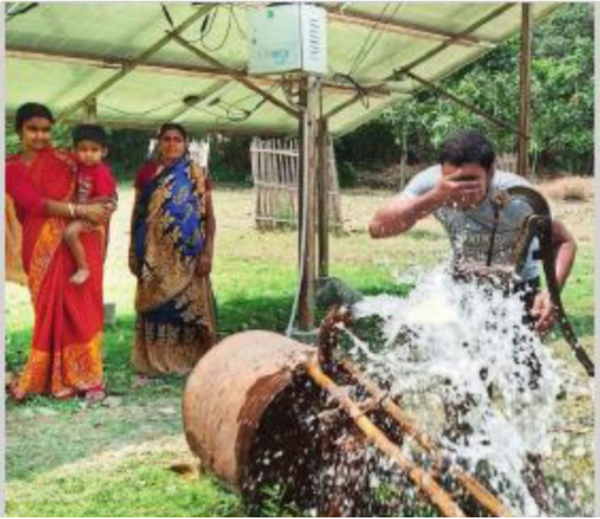
Just when Alok was at his lowest point, representatives of the SwitchON Foundation visited Jatrapur to meet local farmers. They offered training on organic farming and solar technology, introducing Alok and his fellow villagers to the concept of solar pumps and the subsidies available under the PM Kusum Yojana.
A year later, Alok grows multiple crops, and not just during the monsoon. He also revived his pond and ventured into fish farming, adding a new source of income to his farming operations.
The solar pump, unlike its diesel counterpart, is easy and safe to use, allowing even Alok’s wife to manage the equipment in his absence.
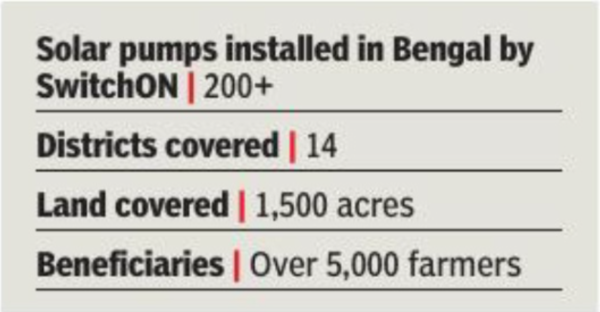
Thanks to the SwitchON Foundation, Alok learned about the environmental benefits of solar energy and has since encouraged other farmers in his village to switch to solar farming.
The journey of the ‘Milletpreneur’
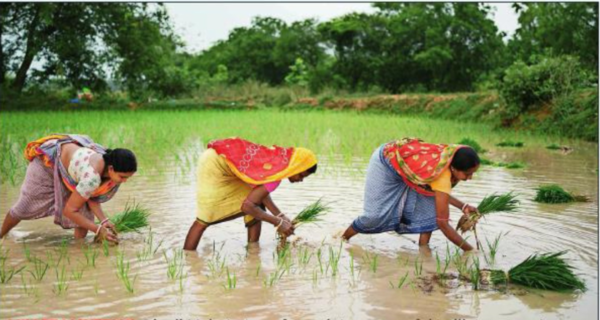
Dipali Mahato, a 34-year-old resident of Kusum Juria village in Hura block, Purulia district, has been transformed from a humble farmer to a successful ‘millet entrepreneur’. Their inspiring journey towards sustainable agriculture, particularly in millet cultivation, has been primarily supported by the SwitchON Foundation, which played a pivotal role in mobilizing farmers, helping to raise awareness about the benefits of millet cultivation and providing the essential tools and knowledge that helped Dipali and many others like her embrace this nutritious, climate-resilient crop.
Dipali’s transformation began with her active participation in state and district level focus group discussions (FGDs) and workshops organized by the SwitchON Foundation. These sessions deepened his understanding of millet cultivation and its many benefits.
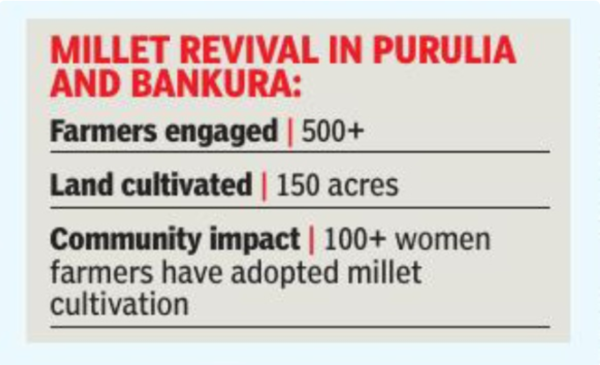
The SwitchON Foundation further helped ensure access to quality seeds, allowing Dipali to begin her millet farming journey on 0.35 acres of land. His initial harvest during the Kharif season yielded 37 kg of millets.
Recognizing Dipali’s passion for cooking, the SwitchON Foundation trained her in millet cooking, helping her expand her repertoire of millet-based recipes.
The collaborative efforts of Anandadhara Prakalpa by WBSRLM and SwitchON Foundation culminated in the inauguration of a Millet Café in Hura Block. Here, Dipali took a leadership role and was actively involved in food preparation and management.
Encouraged by their achievements, more women are now eager to participate in training programs, adopt millet farming practices, and explore entrepreneurial opportunities within their own communities.
“I am excited to prepare and serve different millet recipes like millet laddoo, kheer, fritters, malpua, khichdi and many more,” said Dipali happily.
Dipali’s journey is a powerful reminder of how targeted interventions, skills development and community support can transform livelihoods and empower rural women.



